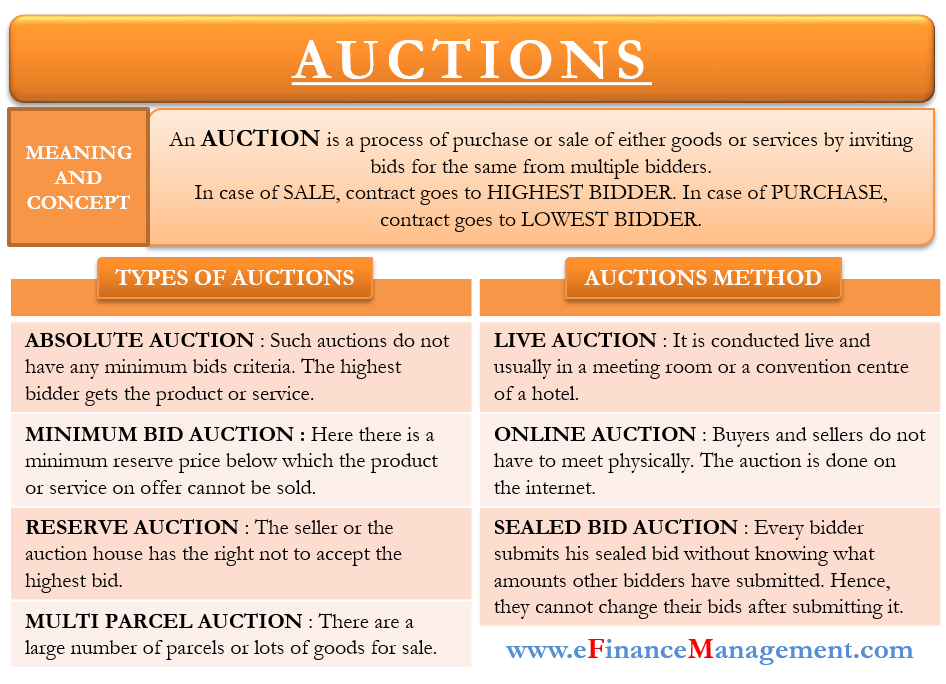Meaning of Auctions
The contract goes to the highest bidder of the products or services if a sale occurs. The opposite happens while purchasing an item or service. Here the bidder offering the lowest price gets the contract. Auctions are most common in cases of rare items, collectibles, antiques, paintings, properties, and even in a few instances of commodities.
An example of an auction is the sale of electromagnetic spectrum licenses by the government of a nation to telecom companies. Any company interested in providing telecom services at the specified location(s) has to bid for the same. The highest bidder will get the license to operate. Another example is the sale of rare and precious items like diamonds or paintings, or antique items through auctions.
Types of auctions
Absolute Auction
Absolute auctions do not have any minimum bid criteria. The highest bidder gets the product or service. For buyers, such auctions are of interest as there is no minimum specified bid, and hence, they can start bidding at low prices. For sellers, such auctions can be a bit dangerous as there is no minimum bid. Therefore, they may have to sell at a lower price than their expectations if the proposal does not go high.
Minimum-bid Auction
In minimum-bid auctions, there is a minimum reserve price below which the product or service on offer cannot be sold. Rest other things are the same as in Absolute Auction. Buyers have an idea beforehand of what minimum amount they will be required to pay if they do. The seller is also sure that his product will go at the minimum reserve price or higher, but not below it.
Many times, the seller or the auction house may fix the minimum bid very high. In such cases, the auction may not attract any bidders at all. It is common in the case of the sale of defunct or bankrupt companies or an airline.
Reserve Auction
In such auctions, the seller or the auction house has the right not to accept the highest bid. The seller may not find the highest bid up to his expectations and hence, may reject the same by the end of the pre-decided time after the auction.
Such auctions can be very advantageous to the seller as he has the option to reject even the highest bid. But it has its limitations as well. Buyers may not turn up at all for such auctions as there are high chances of a failed bid, even when it is the highest. They may end up losing a lot of time and money spent on inquiry and due diligence of the item or property on sale.
Multi-Parcel Auction
In such auctions, usually, there are a large number of parcels or lots of goods for sale. A buyer can bid for one parcel or lot or may bid for several lots.
Also Read: English Auction
Buyers have the advantage that they can bid for a smaller part or even one lot from several lots as per their needs and convenience. Sellers, too, are in a better position to sell off the entire lot in parcels, especially when it is significant and it isn’t easy to find one individual buyer for it.
English Auction
English auction is the auction in which a base price is set for the assets, and bidders are invited to bid above the base price in the ascending value. The item is sold to the highest bidder in this auction.

Methods of conducting auctions
Let us have a look at various methods to conduct the above types of auctions.
Live Auction
It is also called an on-site auction and is conducted live- usually in a meeting room or a convention center of a hotel. Buyers generally inspect the goods beforehand and then participate in such a method of conducting the auction. Here open bids are offered, and hence, the bidding is transparent and error-free. The highest bidder wins the bid as per the auction rules.
Online Auction
It is the most common method of conducting an auction in the present era. Buyers and sellers do not have to meet physically. Therefore, problems such as distance and wastage of time are minimal.
The auction is done on the internet. The opening and closing date for the same is disclosed in advance. Bidders can submit their bids online without having to go to the auction event physically.
Continue reading – Advantages and Disadvantages of Online Auction.
Sealed Bid Auction
This method is preferred where bids are to be kept secret. Every bidder submits his sealed bid without knowing what amounts other bidders have submitted. Hence, they cannot change their bids after submitting them once.
In auctions such as multi-parcel auctions, the auctioneer might prefer such sealed bids so that the bidders can make up their combination of lots and price it well.
Conclusion
Each of the four types of auctions has its advantages and disadvantages, as discussed above. Live auctions can be time-consuming, expensive, and tedious. Also, they may attract lesser buyers. With emerging global markets for products, it has become possible to sell a product or service via online auction across national borders.
Therefore, online auctions are the most preferred method for conducting auctions, be it absolute, minimum-bid, reserve, or multi-parcel auction.

